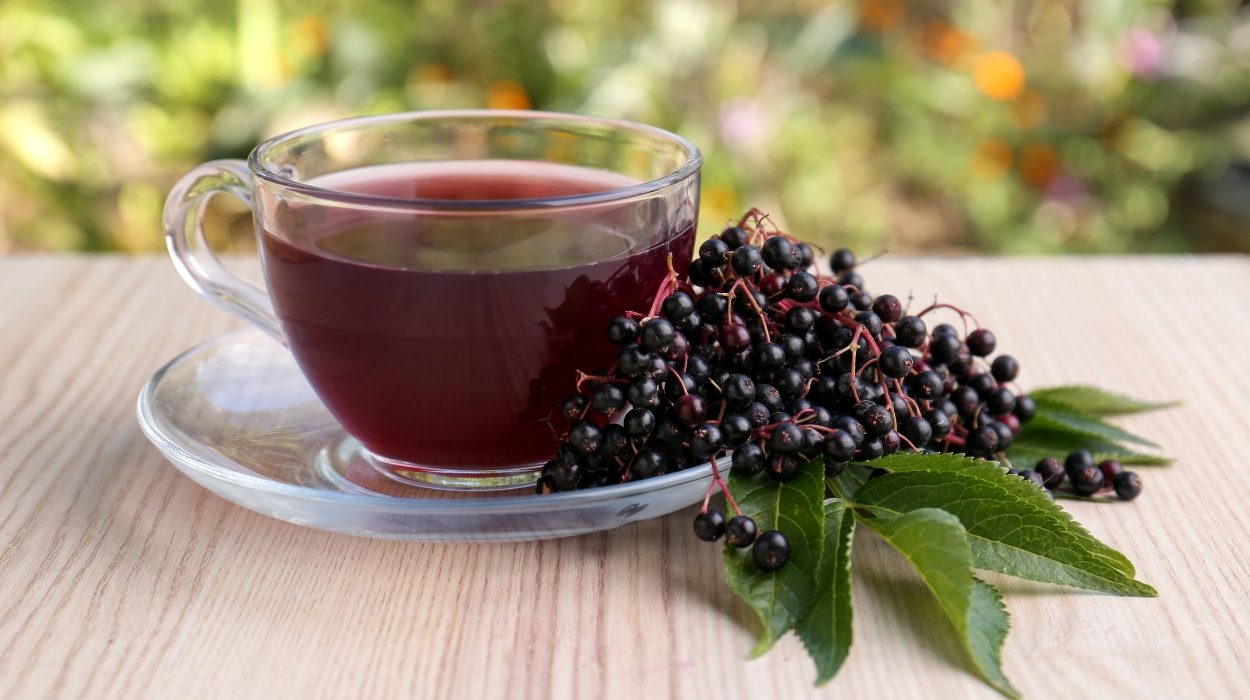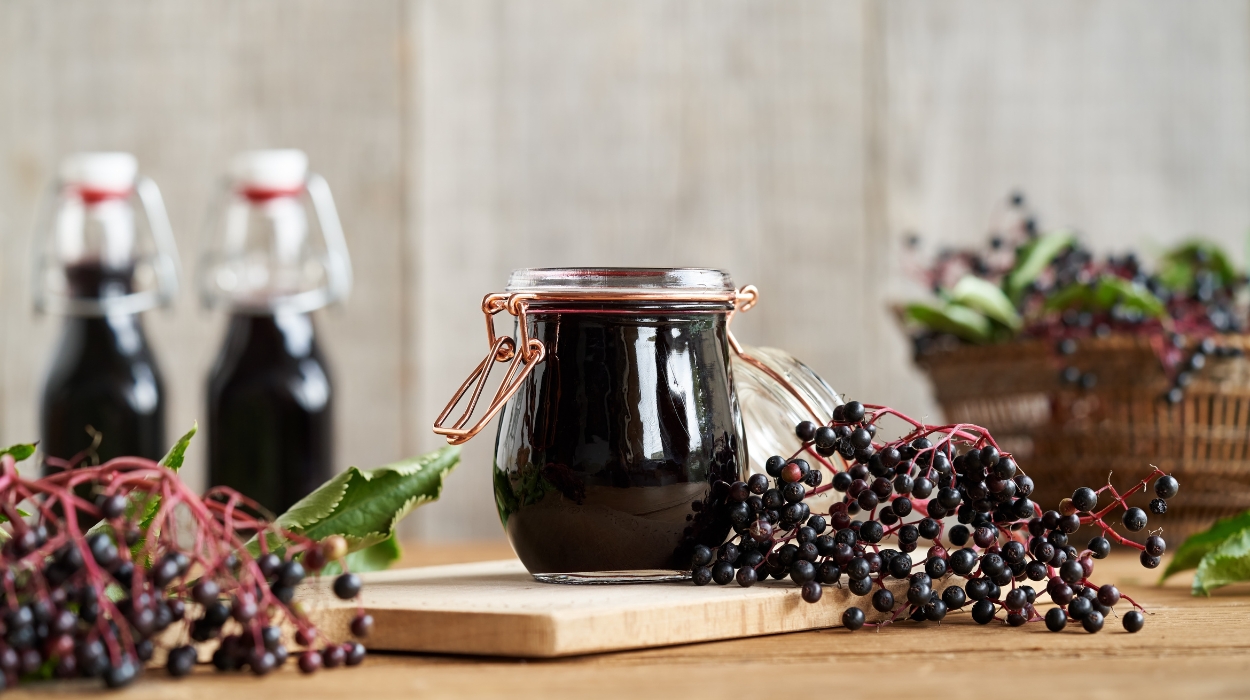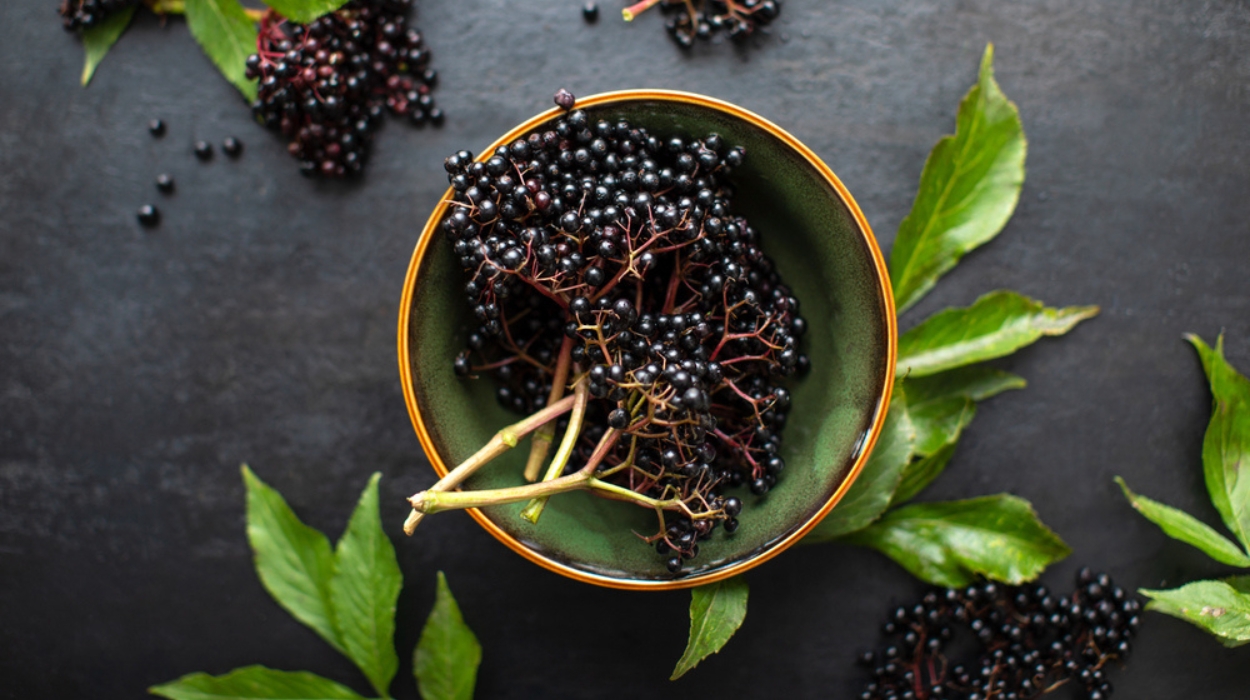Drinking elderberry tea or using elderberry supplements has a wide range of potential health benefits. It could boost your immune system, help you overcome respiratory infections, and improve your cardiovascular health. Elderberry may also reduce your risk[1] of various medical conditions, including cancer, diabetes, and neurodegenerative disorders.
Elderberry has numerous health-boosting properties, but can you take elderberry daily? Read on to learn about the benefits of elderberry products and how to consume elderberry for the best results.
Can You Take Elderberries Every Day?
Most people can take elderberries every day, even multiple times a day, with no side effects. However, pregnant and breastfeeding individuals are not advised to use elderberry products due to a lack of evidence regarding their safety.
Can You Take Elderberry Daily?

Black elderberry is the fruit of the elder tree, a flowering tree native to[2] Europe and North America. Like other berries,[3] elderberries contain abundant antioxidants and are among the healthiest fruits to include in your diet. The benefits of berries could improve many different aspects [4] your health, but is there such a thing as too much elderberry?
Most people can use elderberry products every day with no negative side effects. This includes elderberry tea, elderberry supplements, extracts, and syrup. However, pregnant and breastfeeding women are advised against consuming elderberry.
This is due to a lack of evidence[5] surrounding the safety of elderberry products for pregnant or breastfeeding individuals. There’s no known risk associated with elderberry, except for the toxins in uncooked elderberry products, but without definitive information regarding its safety, pregnant individuals should avoid it. To learn more about the pros and cons of using herbal supplements while pregnant, speak with your personal healthcare provider.
Health Benefits Of Taking Elderberry Every Day
Taking elderberry every day has multiple potential benefits[6] for your heart, immune system, and general health. It also has antiviral properties and is traditionally used in folk medicine to treat respiratory infections.[6] Therefore, elderberry may be especially beneficial during cold and flu season.
When you are infected with influenza, flu viruses attack and invade[7] cells in your lungs and airways. Once inside a host cell, flu viruses start to replicate. The new viruses then leave the host cell and infect other healthy cells as they spread through your respiratory system.
Bioactive compounds in elderberries are thought to inhibit viral replication[2] by preventing their attachment to a host cell. Scientific research has found that elderberry extract can reduce the intensity[8] and duration of flu symptoms in infected individuals. Therefore, elderberry products could help you recover from the flu more quickly.
Elderberry extract has also been found to boost immune function by stimulating immune cells called[9] T cells. T cells are pathogen-killers, and using elderberry to activate them could help your body fight off infections more quickly. There has been some concern that elderberry could overstimulate the immune system, but no evidence supports[6] this.
Elderberry is also high in natural plant compounds called polyphenols.[1] Polyphenols have potent antioxidant and anti-inflammatory effects, so eating polyphenol-rich foods could benefit many aspects of your health.
This is because antioxidants mitigate oxidative stress[10] or damage caused by reactive, oxygen-containing molecules called reactive oxygen species. Oxidative stress plays a key role in the development of medical conditions[11] like heart disease, diabetes, neurodegenerative diseases, and cancer. Therefore, taking antioxidant-rich elderberry on a daily basis may help prevent various chronic diseases.[12]
How To Incorporate Elderberry Into Your Daily Diet

One common way to enjoy elderberry is by drinking elderberry tea. This herbal tea is made with cooked, dry elderberries and can be flavored with cinnamon, ginger, cardamom, or turmeric. It has a slightly tart flavor with earthy undertones but can be sweetened with honey, agave, or elderberry syrups.
Some people prefer to get their antioxidants from elderberry syrup,[13] which is a sweetened, more concentrated version of elderberry tea. You can enjoy a spoonful of elderberry syrup by itself, use it to sweeten other types of herbal tea or coffee, or add it to your smoothie.
Elderberry syrup can be taken every day, even multiple times a day,[14] if you’re using it to treat a cold or flu. However, many store-bought varieties have a high sugar content, so be mindful of this if you’re trying to restrict your sugar intake.
As the popularity of elderberry supplements rises, a greater variety of elderberry products are becoming available. For example, you may find elderberry juice and elderberry gummies at your local health food store.
If you’re just getting started with elderberry supplementation, you may wonder how much elderberry to take. You can eat elderberry gummies every day, but as with elderberry syrup, be aware of their potentially high sugar content.
If you don’t enjoy the tart taste of elderberry, look for elderberry capsules in your local health food store. These contain elderberry extract, so you can enjoy the health benefits of elderberry without having to experience the elderberry flavor.
Whatever your choice of elderberry supplement, taking elderberry every day has many potential health benefits. Other dietary supplements, such as green powders, could further improve your well-being by increasing your overall intake of essential nutrients.
Precautions To Keep In Mind
Elderberry supplements can have far-reaching health benefits, and you can use elderberry daily, even multiple times per day. However, it’s important only to use elderberry products from reputable stores and never to eat raw elderberries.This is because the raw berries contain toxic substances, which, if consumed, can have harmful consequences.
Sambunigrin and prunasin[15] are two compounds found in raw elderberries. They are converted to cyanide during digestion and, when eaten, can lead to acute cyanide poisoning. This can cause potentially serious symptoms,[15] including a drop in blood pressure, rapid breathing, dizziness, vomiting, diarrhea, and convulsions.
Due to the potentially harmful effects of raw elderberries, it’s best to resist the urge to forage your own. Fortunately, you probably won’t find the uncooked berries in health food stores. Black elderberry is usually sold cooked and dried or ready-processed into supplement form.
Elderberry has laxative and diuretic[16] effects and may be used as a natural remedy for constipation.[17] While this could be seen as a positive, drinking too much elderberry tea could cause some gastrointestinal issues.
Most people can take elderberry daily with no negative side effects. However, pregnant and breastfeeding individuals are typically advised to avoid elderberry products. This is due to a lack of evidence[5] regarding the safety of elderberry products for fetuses and babies.
Overall, elderberry supplements are generally safe to take daily, and research suggests many health benefits. More research is needed before elderberry supplements can be recommended to pregnant or breastfeeding individuals.
Conclusion
When you’re learning how to start eating healthy and improving your nutrient intake, it’s easy to become overwhelmed by choice. A wide range of herbal supplements with impressive potential health benefits are available. However, if you’re looking for a good, all-round health-boosting supplement, elderberry products could be the way to go.
The health benefits of elderberry are largely due to the antioxidant and anti-inflammatory properties of polyphenols. These plant compounds are abundant in berries[18] and could have significant benefits for your immune system, cardiovascular function, and overall long-term health.
Remember, although other types of berries make healthy late-night snacks, elderberry fruit can’t be eaten raw. This is because they contain harmful compounds that are converted to toxins when digested. If you’re looking for something to snack on at night, read up on the benefits of olives, other berries, and nuts.
Frequently Asked Questions
There’s no reason why you shouldn’t take elderberry supplements daily long-term. The active compounds in elderberries, called polyphenols, have antioxidant and anti-inflammatory properties that can benefit your health in numerous ways.
For most people, there are no known side effects of taking elderberries daily. Elderberry products are well-tolerated by most people and may benefit many aspects of your long-term health. However, taking too many elderberry products could have laxative effects.
You can take elderberries alongside most other supplements. However, it’s important to remember that elderberries have laxative effects,[19] and combining them with other laxatives could cause gastrointestinal problems.
You can take elderberry products every day, even multiple times a day. Most people can tolerate elderberry supplements well, so you should be able to use them frequently with no side effects.
It’s safe to drink elderberry tea every day. Elderberry tea is rich in polyphenols, and drinking it every day could have long-term health benefits. However, elderberries have diuretic and laxative effects, so drinking large quantities of tea could cause stomach issues.
 Evidence Based
Evidence Based
